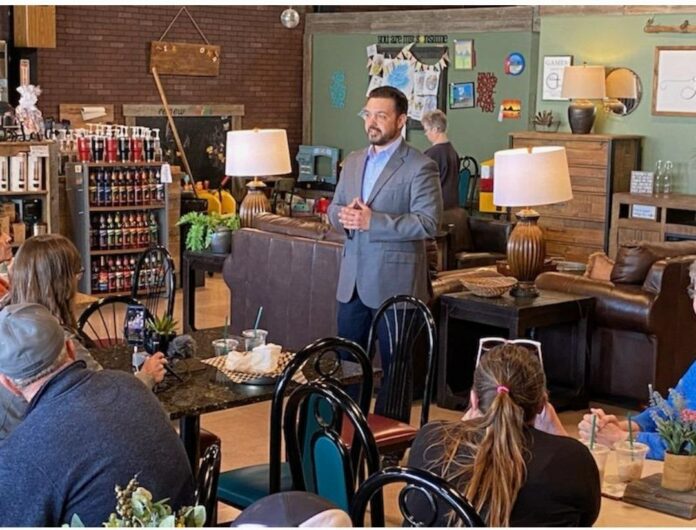
Republican primary hopeful Eric Parker aims to defy past, partisanship
By Eric Valentine
For a man who is seen by many in his state through a lens firmly embedded in his past, Eric Parker sure has a clear idea of the future. And it involves him sitting in the Idaho State Legislature as a Senator sponsoring bills, allowing bills to the floor so he can—in some cases—publicly vote them down, and advocating for the working class by being “transparent and available”—his starting point for what a politician is supposed to be.
If all that—or even some of that—happens, the South Valley husband, father, and electrician who also founded The Real 3% of Idaho will likely be able to turn to a “hold my beer” moment he had at the Capitol during the Idaho State Legislature’s session this year.
In Under 20 Minutes
Long story (medium) short: There was an attempt to repeal the grocery tax—that 6% sales tax we pay on food, something Californians and roughly 40 other states’ residents don’t have to do. We get it back. That is, if you pay your income taxes and check the right box on that form that costs more to fill out than the refund you’ll get for buying food. Anyway, the bill looked like it was lacking enough votes to pass so bill sponsors were going to shove it in the drawer for another year, like bachelor groceries. Parker’s Republican legislature friends were ready to give up, but Parker—who says a grocery tax should be unthinkable when the working class struggles like it does—wanted every politician to at least have to face the public and vote. So Parker, with his thick, dark, Idaho-proud beard, in front of a room full of non-establishment Republicans, said, “Has anyone asked the Democrats (to send the bill to the floor for a vote)?”
Silence.
Parker said, “Give me 20 minutes” and headed across the aisle (pretty much literally) to District 26 Sen. Michelle Stennett’s office, who wasn’t returning his text. How did it go when the 2nd Amendment-honoring man who … is not an elected official but spends significant time at the Capitol networking with elected officials telling them the concerns his hopeful-voters are telling him and was arrested and sent to prison at Bundy Ranch for pointing a rifle at federal agents … walked into the senator’s office?
“I went in there with a smile and just got to the point,” Parker said. “She was a total pro.”
And in that moment Parker and Stennett (OK, mostly Parker, but still) did something very rare in state capitols these days. They chose bipartisanship over the status quo, so they could do what they were sent to Boise to do: Vote on stuff, and even differently from one another if they so choose.
It was an anomaly.
“And this shouldn’t be an anomaly, this should be what we do,” Parker said.
A Primary Primary
In less than a month, Parker will face off against a member of his own party in order to face off against the eventual Democratic nominee in November. It’s the first time he’s had to do that, and one can tell it doesn’t sit entirely easy with him.
“George Washington warned us that partisan politics can destroy us,” Parker said.
And, he adds, his party’s state platform is “spot on.” And then this is where any uneasiness lifts its face as Parker says some of his Republican colleagues (hint hint) do not seem to legislate that way.
How accurate his opinion is on that or whether it will be enough to matter, only May and November will tell.
“The labels put on me are not accurate. I’m working for the people,” Parker said.
His big issues … correction, what he says are the big issues for the people in the community he talks to (he really is a populist) include:
• Lava Ridge windmill project
• Labeling citizen parents of public school students domestic terrorists
• Tax reforms (grocery tax, property tax relief, and more)
Parker feels he has the extra burden, though, to get his story out to the media. Because, here comes the irony of it all, eight years ago the media constantly put his story out there. And in some cases, it wasn’t even his story, it was his image in a photograph, to add color and context to the Bundy story. It doesn’t justify what Parker did—he served time for it—but it reveals the difficult position the media is in whenever Parker is in the news. Can you really tell an Eric Parker story and not use the words: Ammon, Bundy, ranch, rifle, militia,? Perhaps!
According to Parker, a reporter at the Idaho Mountain Express—the paper of record for the Valley—had conducted a 45-minute interview with him on Senate Bill 1398. This is the bill that Parker says would—essentially—have protected all Idaho parents of public school children from being labeled a domestic terrorist by the federal government. It’s a bill that last year passed in the House but not the Senate and vice versa this year. Go figure, and Parker says he can explain why, and did so to the reporter. Translation: The bill is getting significant support, but because one way to assert one’s 1st Amendment right is to state the opinion that what Parker did at the Bundy Ranch is domestic terrorism, it can be easy to dismiss Parker’s push for this bill as, perhaps, a vindication of sorts.
Parker could explain to you until you turn blue in the face (or just turn “blue”) why the two situations are different. And the Idaho Mountain Express could justify (and do it honestly) why they journalistically don’t see a news story there, but rather a marketing piece for the Parker for Idaho campaign.
But at least the community is making it transparent and available now. Someone had to do it.


